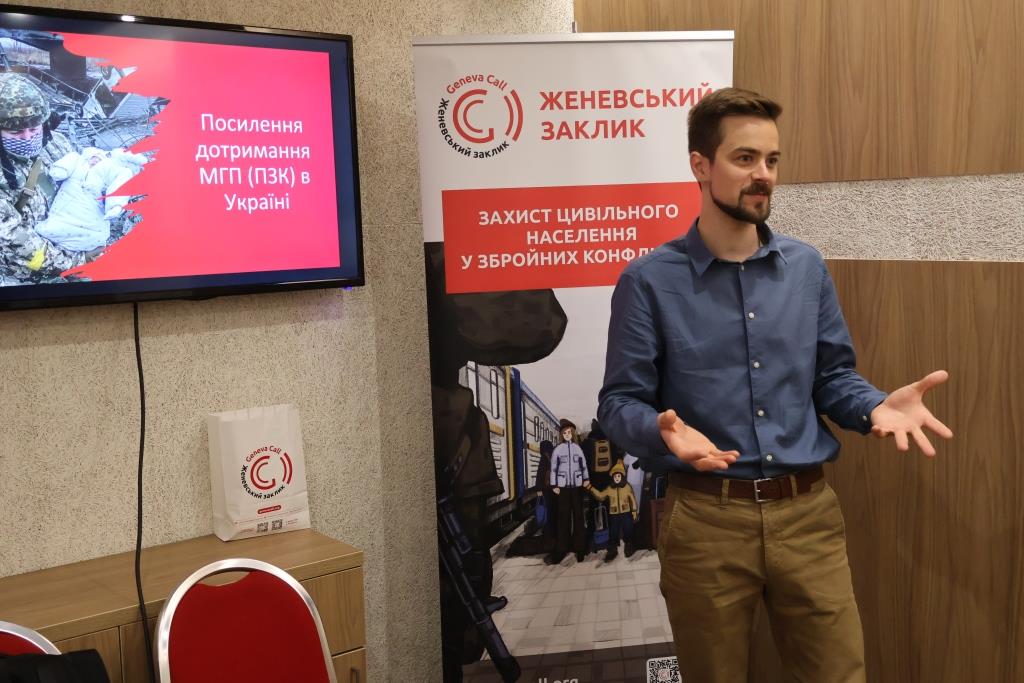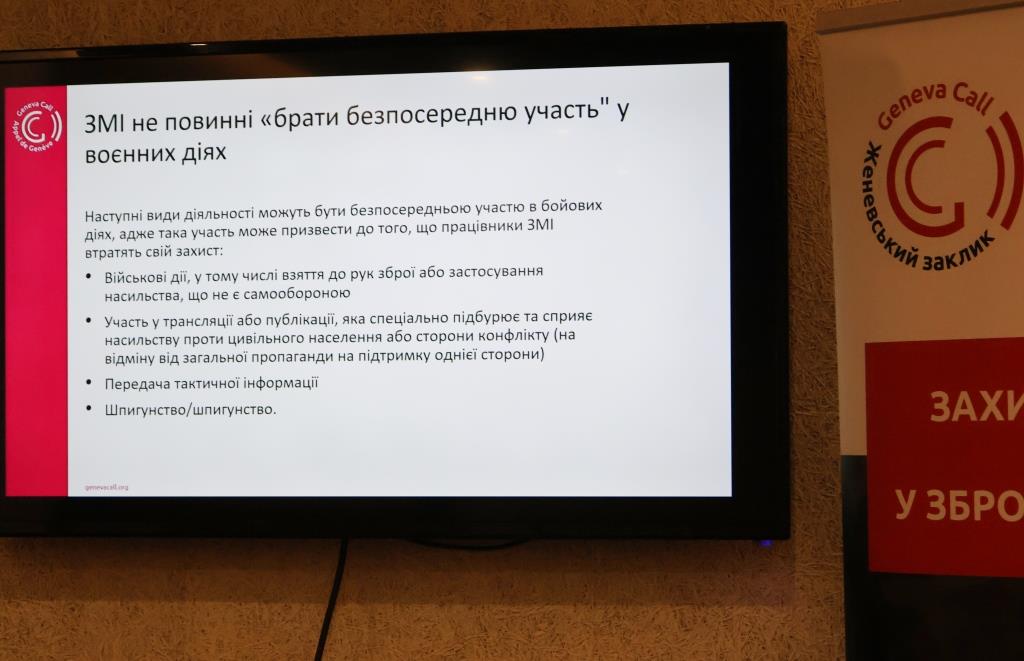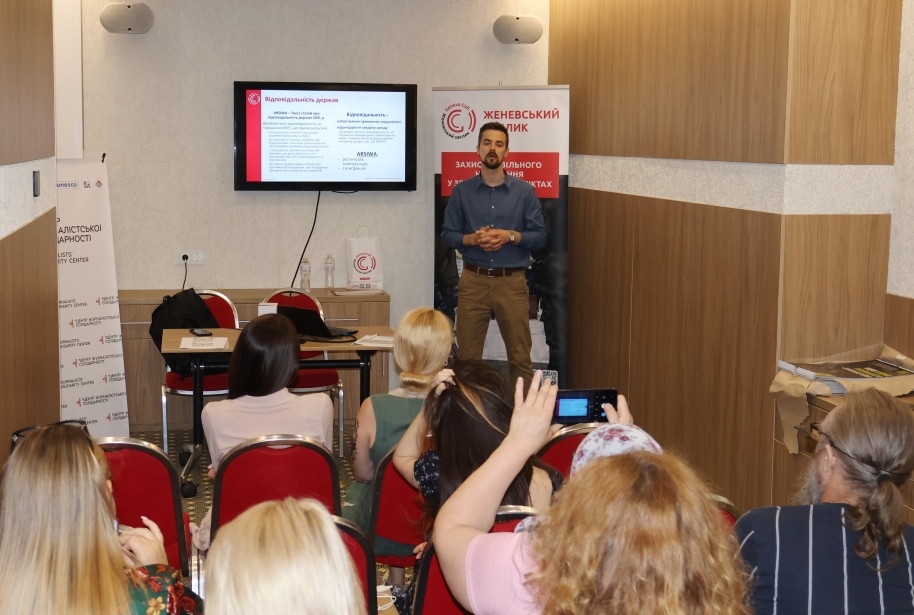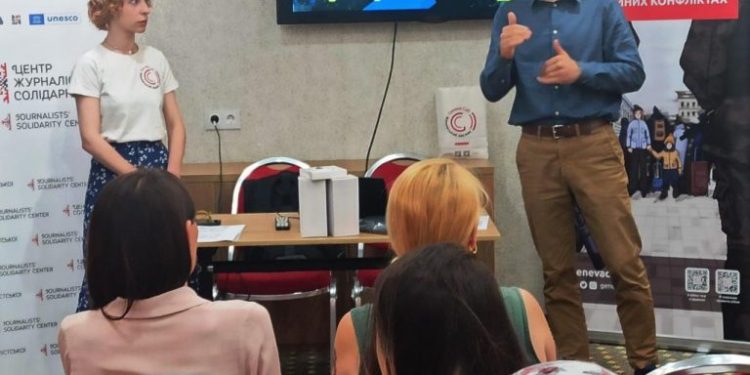Representatives of the journalistic community of the Dnipropetrovsk Region got acquainted with the basic principles of international humanitarian law and key terms. Most importantly, they talked about how media workers can influence the observance of such important norms during the war through their work. It happened at a training on international humanitarian law, the speaker of which was Yurii Usmanov, an advisor on legal and political issues of the international humanitarian organization Geneva Call.
To professionally arm colleagues
“The war in Ukraine continues. Journalists are waging a difficult struggle on the information front. At the Dnipro Journalists’ Solidarity Center, we held many events to arm our colleagues professionally and expand their knowledge. Today, we revealed a rather new and, at the same time, complicated topic: the role of the media in strengthening compliance with the norms of international humanitarian law. Why is this important? Our society knows that international law operates in the world. But the question arises as to why the rules recognized by the entire civilized world are not always followed. Journalists can explain the answers to these and other questions to their audience. Of course, with the help of experts,” Nataliya Nazarova, the coordinator of the Dnipro JSC, noted.
Before conveying this information to the public, media workers must understand the terminology and understand the risks that arise when covering international humanitarian law. This will help avoid mistakes in the future.
About the status of a journalist and proper informing
“International humanitarian law is about the rules of conducting an armed conflict. An armed conflict begins with an act of aggression by any side. For example, crossing the border and introducing troops into the territory of another sovereign state is already an act of aggression and a violation of Article 2 of the UN Charter. Its essence is that it is impossible to resolve any disputes by military means,” Yurii Usmanov emphasized.
Compliance with international humanitarian law is a duty. But in armed conflicts, the parties do not follow these rules 100%. However, everyone should know that there is responsibility for violations of international humanitarian law. Journalists who cover similar cases play a big role here. And as a result, they affect the prosecution of the aggressor.

“In order for journalists to correctly cover international humanitarian law, they need to clearly distinguish the boundaries of its regulation. First, international humanitarian law regulates the conduct of parties to a conflict to reduce casualties among civilians or those who do not or have ceased to participate in hostilities. In turn, international humanitarian law does not prohibit the use of force on the battlefield, does not protect all those affected by the conflict,” the expert noted.
He also drew attention to the status of journalists in armed conflicts. In particular, international humanitarian law defines two “types” of journalists: a war correspondent and an ordinary journalist. If a war correspondent, as a person accompanying the armed forces but not actually part of them, is captured by the enemy, then, according to Article 4 of Geneva Convention III, they are considered a prisoner of war.
Citizen journalists on assignment in a zone of armed conflict should be respected and protected as long as they do not take direct part in hostilities. Therefore, a journalist should realize here people who are close to the military can die at any moment. To understand the severity of the situation, here is a simple example. A piece of military equipment stops in one of the settlements. Children, having tentatively seen a tank, may want to take a picture next to it. However, such type of equipment is a primary goal for a conflict participant. So, its destruction may cause harm to civilians. In such cases, journalists can also work by telling the audience about the dangers of such actions.

“The media should not take direct part in hostilities. In some cases, a media person may even lose their status and, accordingly, protection. This can happen when a journalist transmits tactical information, spies, commits violence, takes up a weapon (if it is not self-defense), or becomes a participant in incitement against the civilian population,” Yurii Usmanov emphasized.
Questions were not left unanswered
The organizers also prepared small practical tasks for the training participants. Journalist and freelancer Yeva Avramenko confirmed that this format of work helped to better absorb information.
“I used to think that I had basic knowledge about international humanitarian law. But after the training, I realized that almost all the information was new to me. The training was incredibly meaningful and high-quality. This is especially valuable in our difficult times when even an experienced journalist needs to acquire new knowledge,” said Yeva.
Valentyn Khoroshun, a displaced journalist from the Donetsk Region, had a lot of questions during the training, and he admitted that he got answers to all of them. This is the value and quality of such events.
“It left a pleasant impression. The training was deep and comprehensive. The topic is generally not new, but there were questions that I discovered for myself in a new way,” notes Valentyn Khoroshun.
“This is not the first time I work with a journalistic audience. It is pleasant to work with knowledgeable media people who discuss, ask questions, and justify their opinions. It is necessary to study international humanitarian law to immerse oneself in this topic. Your awareness will help you interact informationally with state and law enforcement agencies. Who, if not journalists, can explain serious things in simple language,” concluded Yurii Usmanov.
Call the Dnipro JSC at 050 919 8479 (Nataliya Nazarova, the Dnipro JSC coordinator). The Center’s address is 8 Starokozatska Street.

ABOUT JSC
The Journalists’ Solidarity Centers is an initiative of the NUJU implemented with the support of the International and European Federations of Journalists and UNESCO. The initiative is designated to help media representatives working in Ukraine during the war. The Centers operate in Kyiv, Lviv, Ivano-Frankivsk, Chernivtsi, Zaporizhzhia, and Dnipro and provide journalists with organizational, technical, legal, psychological, and other types of assistance.
ABOUT UNESCO
UNESCO is the United Nations Educational, Scientific, and Cultural Organization. It contributes to peace and security by promoting international cooperation in education, sciences, culture, communication, and information. UNESCO promotes knowledge sharing and the free flow of ideas to accelerate mutual understanding. It is the coordinator of the UN Action Plan on the Safety of Journalists and the Issue of Impunity, which aims to create a free and safe environment for journalists and media workers, thus strengthening peace, democracy, and sustainable development worldwide. UNESCO is working closely with its partner organizations in Ukraine to provide support to journalists on the ground.
The designations employed and the presentation of material throughout this digest do not imply the expression of any opinion whatsoever on the part of UNESCO concerning the legal status of any country, territory, city, or area or its authorities or concerning the delimitation of its frontiers or boundaries.
The authors are responsible for the choice and the presentation of the facts contained in this digest and for the opinions expressed therein, which are not necessarily those of UNESCO and do not commit to the organization.
Dnipro JSC information service

 THE NATIONAL UNION OF
JOURNALISTS OF UKRAINE
THE NATIONAL UNION OF
JOURNALISTS OF UKRAINE
















Discussion about this post